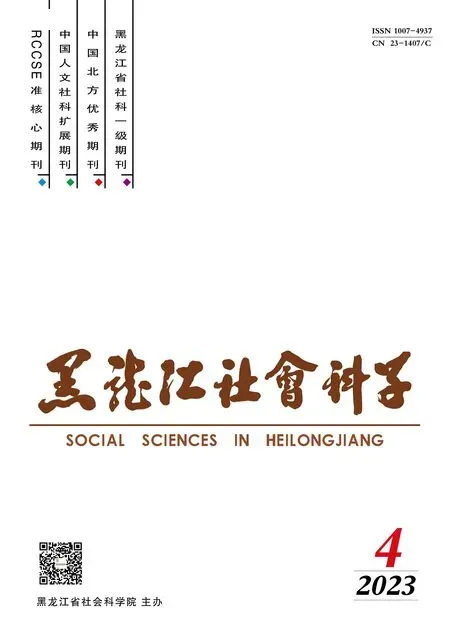ABSTRACTS
TheHistoricalEvolution,MechanismandPathoftheConstructionofNationalSecuritySystemwithChineseCharacteristicsintheNewEra
GUO Yong-hui, SONG Wei-feng
(NorthwestUniversityofPoliticalScienceandLaw,Xi’an710063,China)
Abstract:The proposal of a sound national security system as an important content of the 20th National Congress of the Communist Party of China is sufficient to prove its significant role in preventing and resolving national security issues. The original intention of constructing a national security system was to maintain and shape national security, and the rise of the field of national security disciplines stems from the comprehensiveness of national security issues, covering multiple disciplines, which can’t be solved by a single discipline. Therefore, it is necessary to see through the basic characteristics of the national security system with Chinese characteristics in the new era from the perspective of historical evolution, and grasp the construction mechanism of system elements, rule of law, and systematization. At the same time, by tracing the origin of security ideology in China’s history and using a systematic approach, from the dimensions of system elements, structure, and security environment, we examine the shortcomings of the national security system system. Using security concepts, leadership systems, security systems, and security forces as carriers, we propose a construction path to promote the modernization of the national security system with Chinese characteristics in the new era.
Keywords:National Security System; National Security System; Equal Emphasis on Coastal and Border Defense; System Openness
TheLogicandApproachofEmpoweringRuralRelativePovertyGovernancewithDigitalIntelligence
GAO Hong-gui1,Song Ning2
(1.SchoolofMarxism,ShandongTechnologyandBusinessUniversity,ShandongYantai264005,China; 2.HeilongjiangAcademyofSocialSciences,Harbin150028,China)
Abstract: In the era of intelligence, the advancement of digital and intelligent technology, which combines the dual characteristics of “digitization” and “intelligence”, has given rise to new developments in the field of government governance of relative poverty in rural areas. This article elaborates on the triple internal logic of empowering governance from the perspective of digital government construction, namely the technological logic demonstrated by blockchain technology, platform construction, and digital management in promoting transparency, efficiency, and precision in governance; effectively integrating various social systems and enhancing the institutional logic inherent in organizational resilience; the value logic highlighted by the concept of people-oriented governance. In addition, examining the current governance situation, there are still difficulties in terms of technology, organization, and subject, which constrain the process of rural relative poverty governance. To this end, through the continuous development of digital intelligence technology, continuous improvement of organizational system, promotion of diverse subject participation, improvement of farmers ’ acceptance, and cultivation of digital elite talents in five dimensions, we will promote the further development of digital intelligence empowerment in rural relative poverty governance.
Keywords:Digital Intelligence; Rural Relative Poverty; Relative Poverty Governance; Digital Government Construction
AnalysisandEnlightenmentontheOperatingMechanismofRuralLandTrustTransferintheUnitedStates
LIU Zhao-jun , ZHU Yu-hang
(SchoolofPublicAdministrationandLaw,NortheastAgriculturalUniversity,Harbin150030,China)
Abstract: As one of the innovative ways of circulation, rural land trust circulation plays an important role in promoting the moderate scale operation of land, and forms a good condition for the effective release of land management rights. However, the transfer of rural land trust in China started relatively late. In the face of the new requirements of modern agricultural development and the implementation of the “Three Rights Separation” of contracted land, it still needs to further build and develop on the basis of international experience. Based on the theory of land property rights, this paper explains the operation mechanism from four aspects: subject, operational relationships, classic mode and guarantee, so as to clarify the experience of this system in the United States. At the same time, it combs the practical exploration of rural land trust circulation in China, forms an overall analysis from the perspective of subject relationship, summarizes the problems faced, and then puts forward suggestions for improvement by referring to the corresponding experience of rural land trust circulation in the United States.
Keywords:Rural Land Trust Transfer; Operating Mechanism;the United States;Enlightenment
AStudyonFamilyInvolvement,PoliticalConnections,andthePerformanceofChinesePrivateEnterprises
WANG Ji-chao, CHEN Nan, ZHANG Xian-ling
(SchoolofSocietyandPsychology,CentralUniversityofFinanceandEconomics,Beijing100089,China)
Abstract:In recent years, research on the impact of family involvement, institutional environment, and political connections on corporate performance has received increasing attention from scholars. This article uses data from the 2016 survey of Chinese private enterprises and adopts a multiple linear regression model to study the impact of family management involvement, ownership involvement, and political connections on the performance of Chinese private enterprises. The research results indicate that the involvement of family management rights is negatively correlated with the economic performance of Chinese private enterprises, while the involvement of family ownership and political connections have a significant positive effect. Based on empirical analysis results, Chinese private enterprises should take the following measures to improve corporate performance: Firstly, moderately weaken the involvement and control of family management rights in the enterprise;The second is to develop and improve various incentive and disciplinary systems to avoid family members’ irregular behavior and “free riding” profit-making behavior in enterprise management;The third is to construct political connections based on development needs and create good government enterprise relationships.
Keywords:Family Involvement; Political Connections; Private Enterprise Performance

